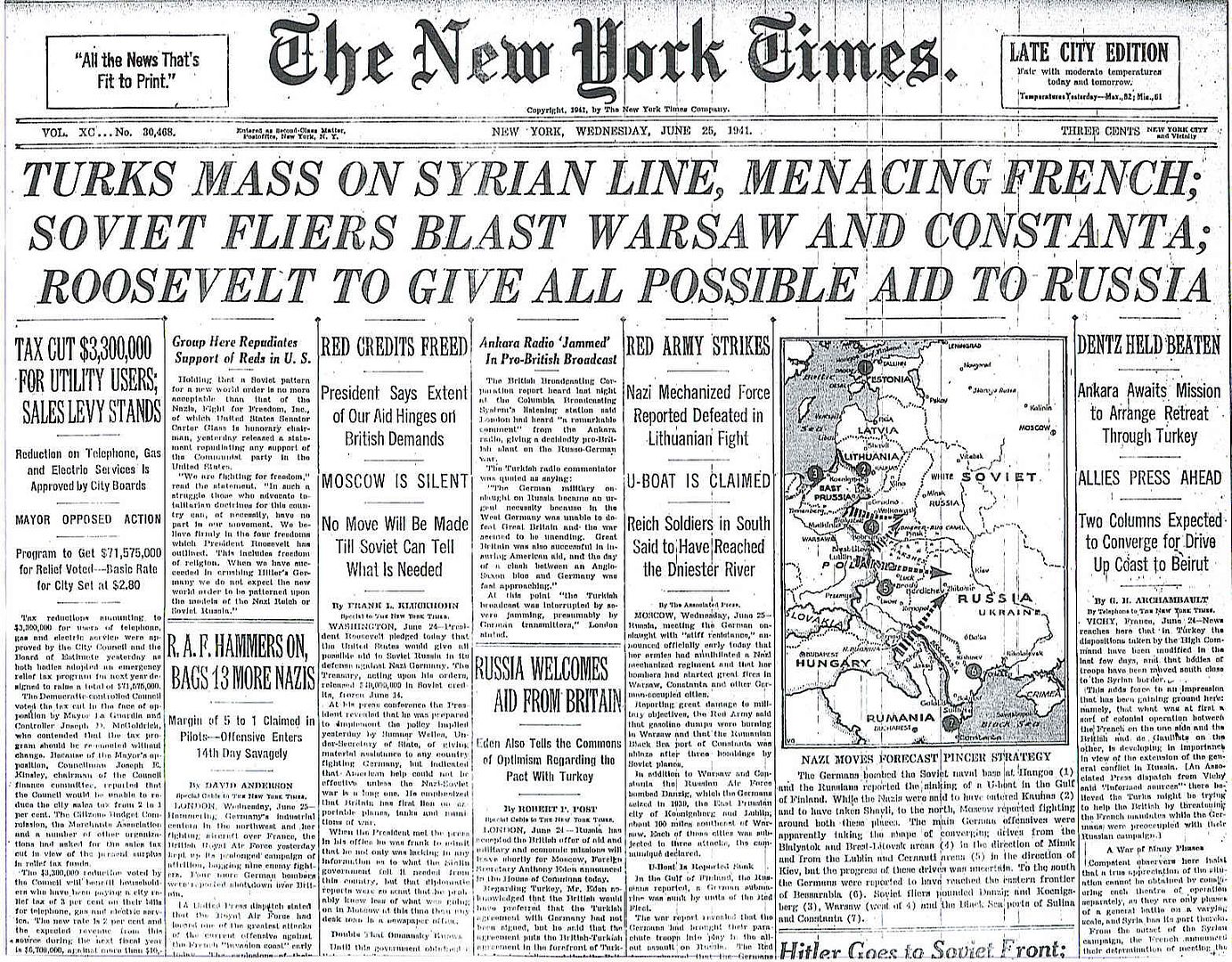
Posted on 06/25/2011 4:59:13 AM PDT by Homer_J_Simpson

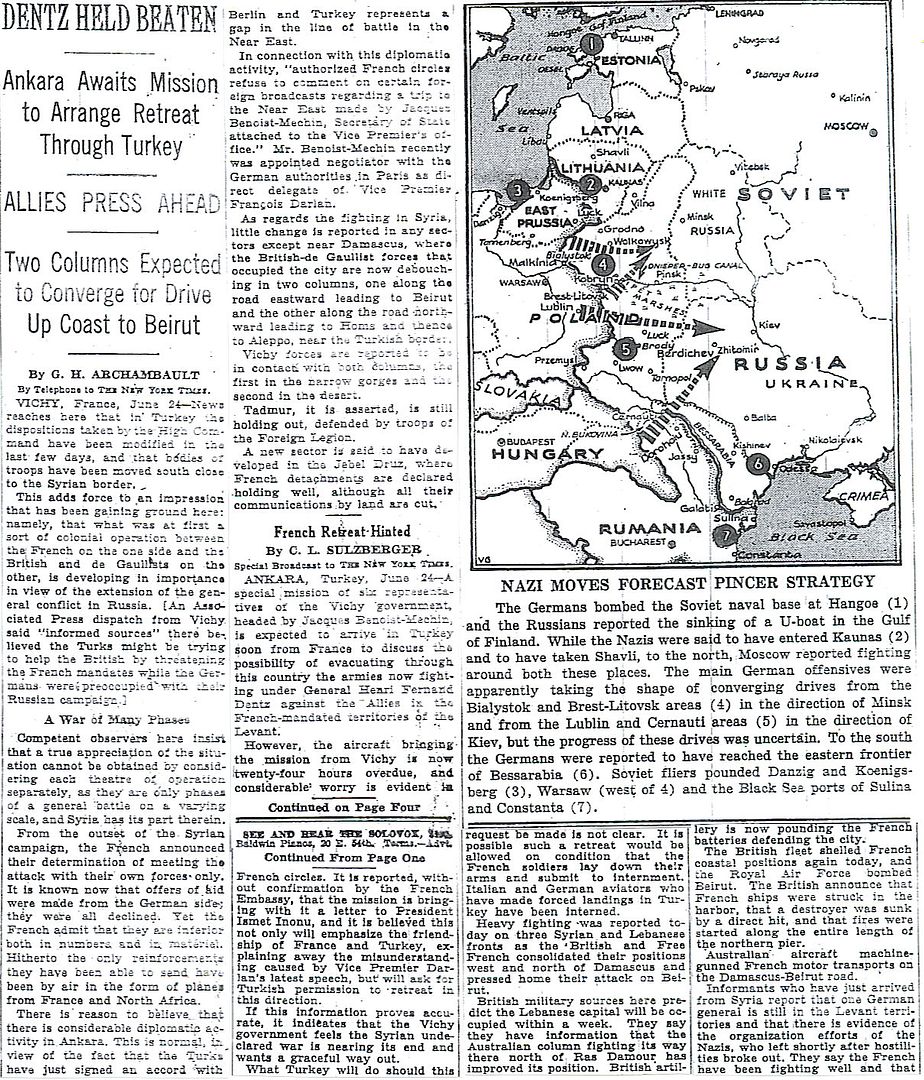
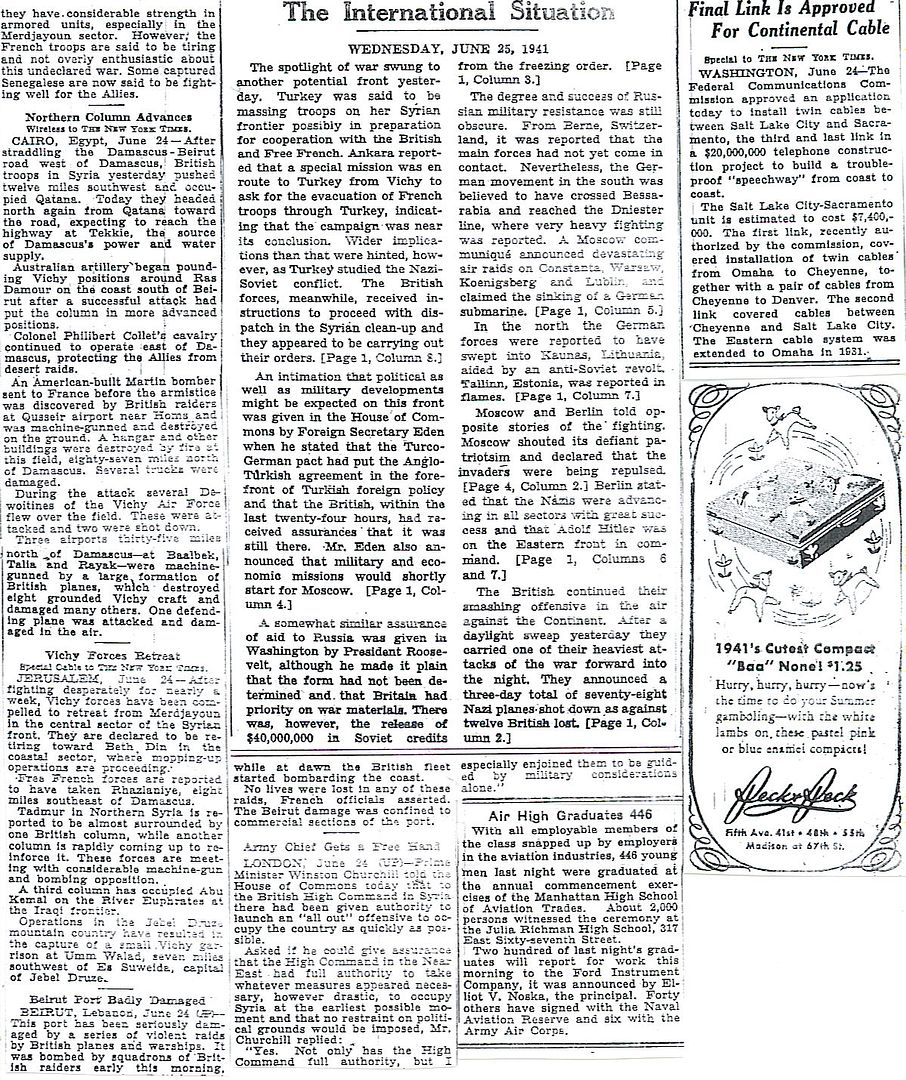
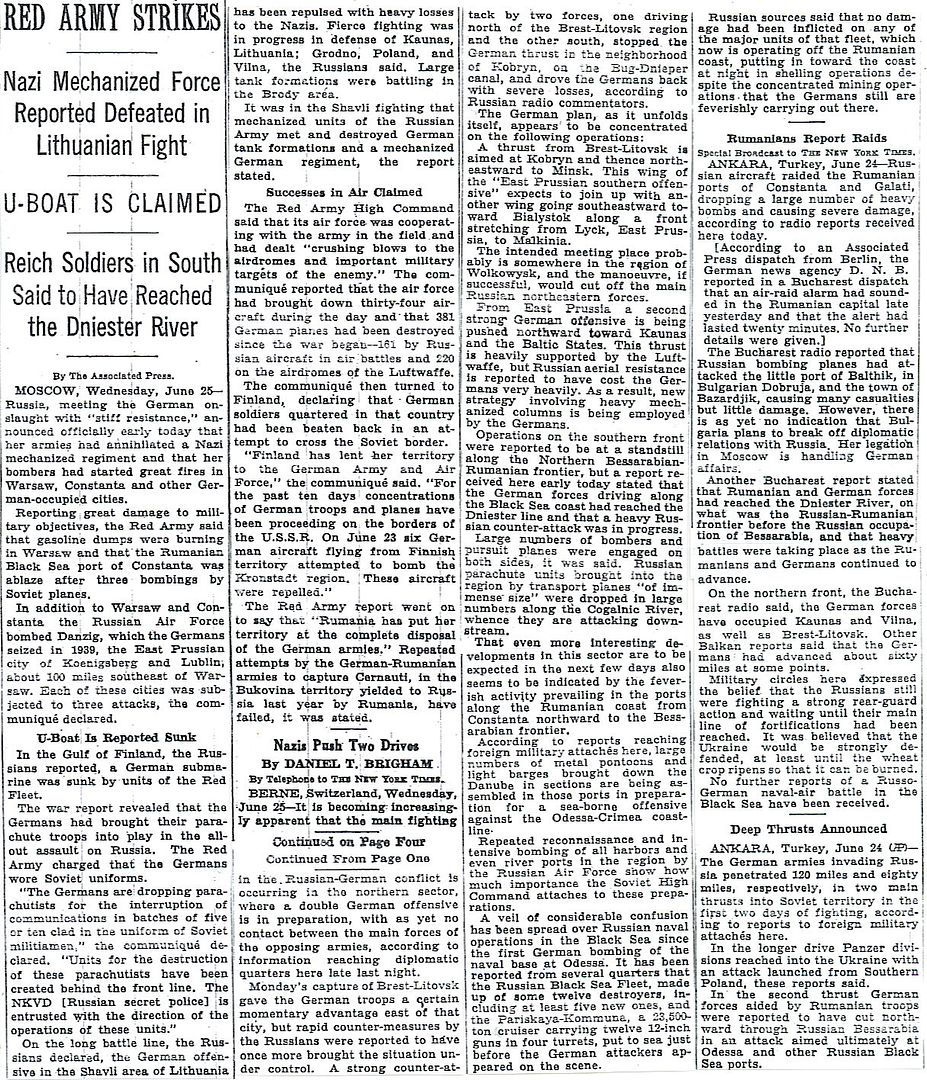
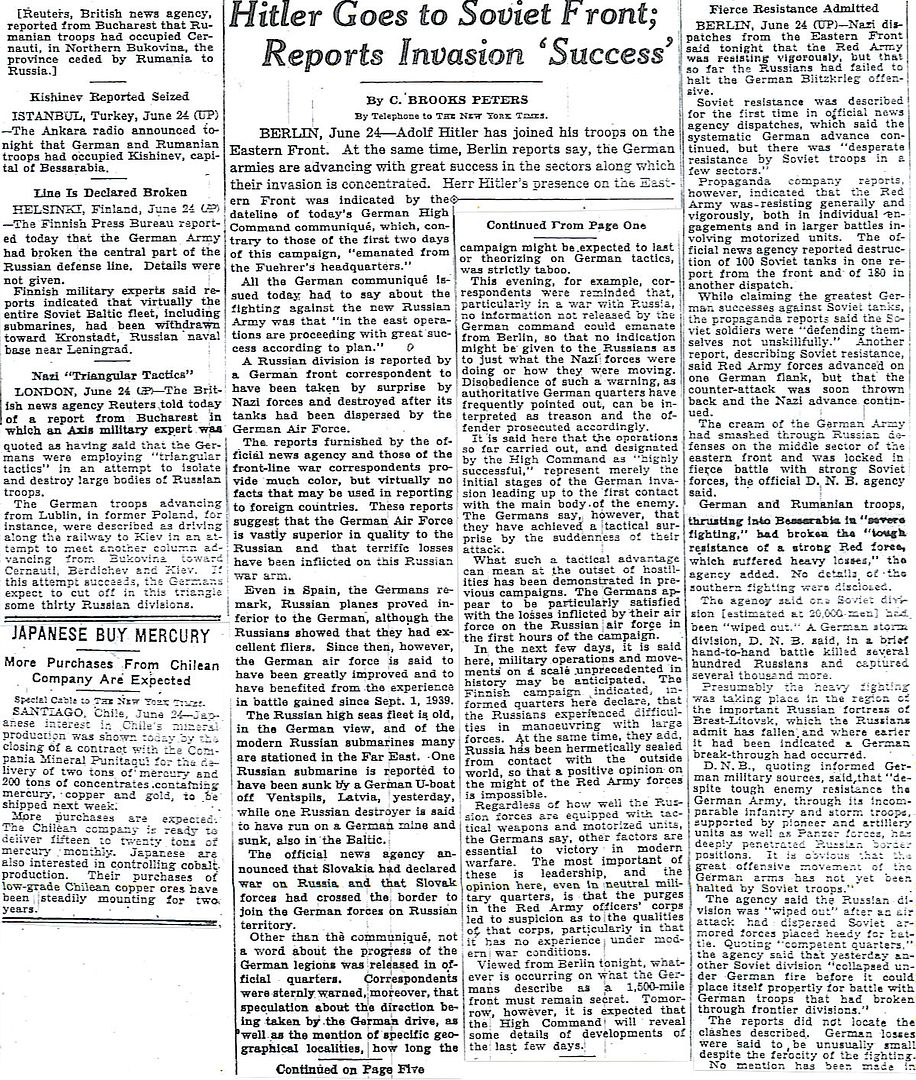
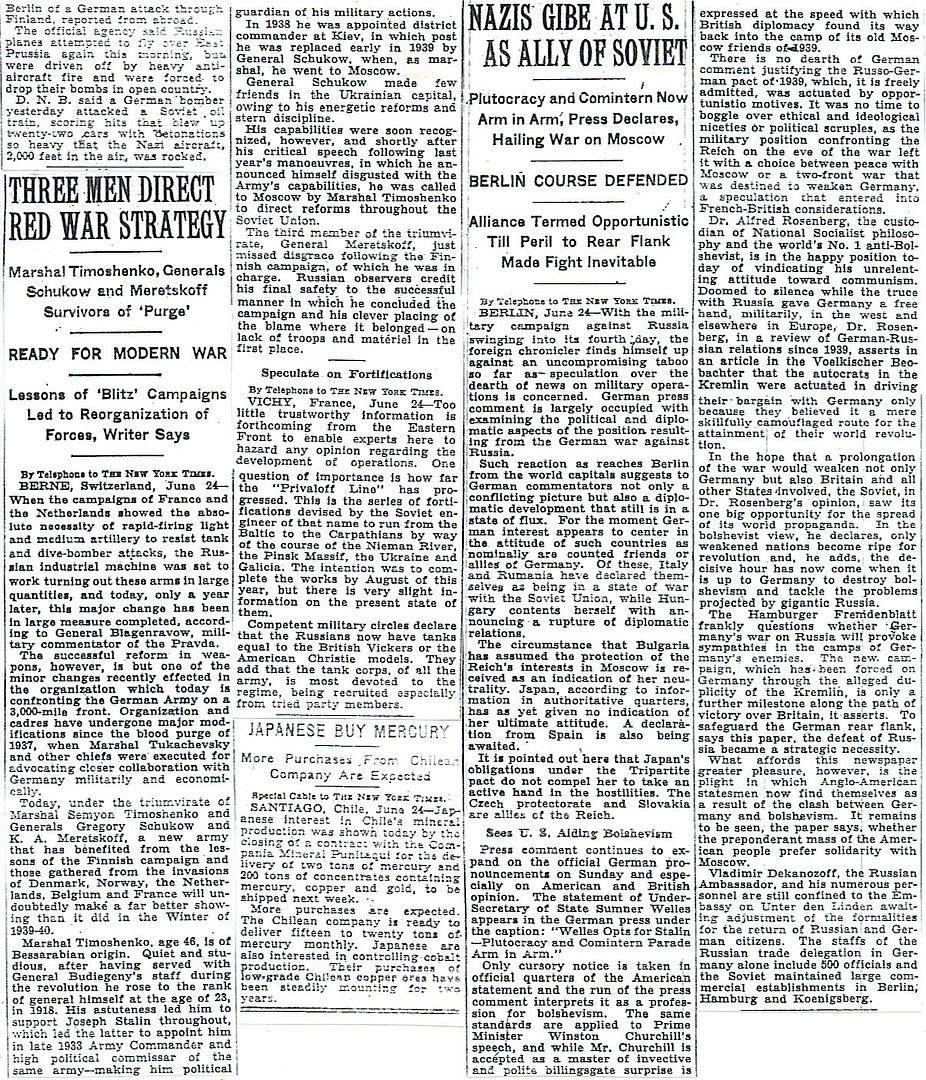
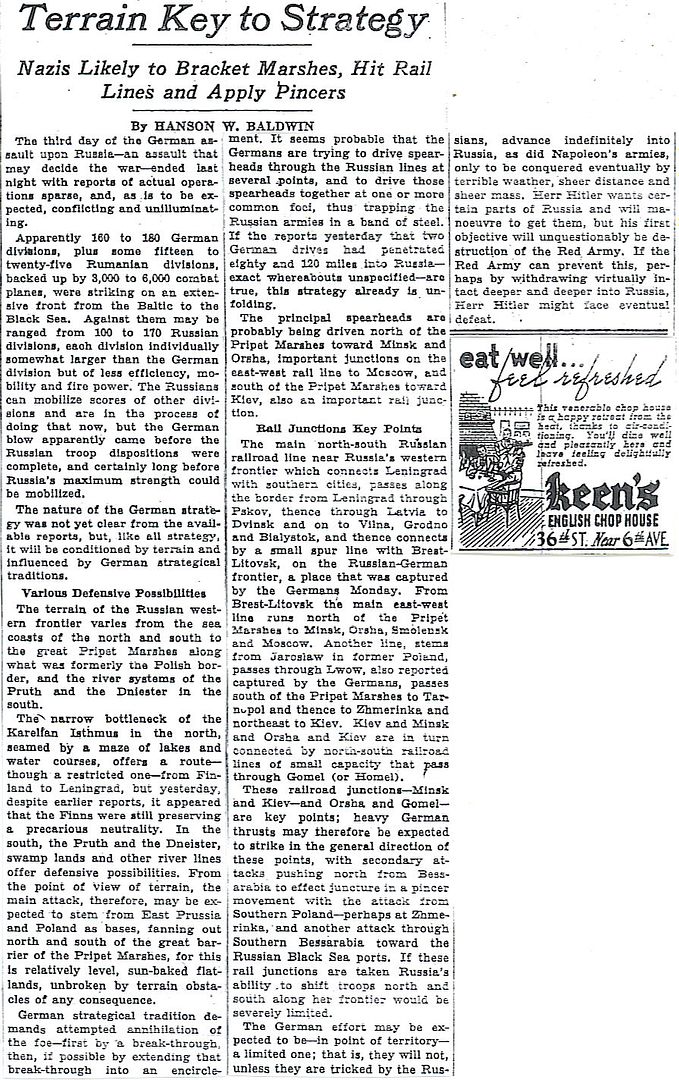
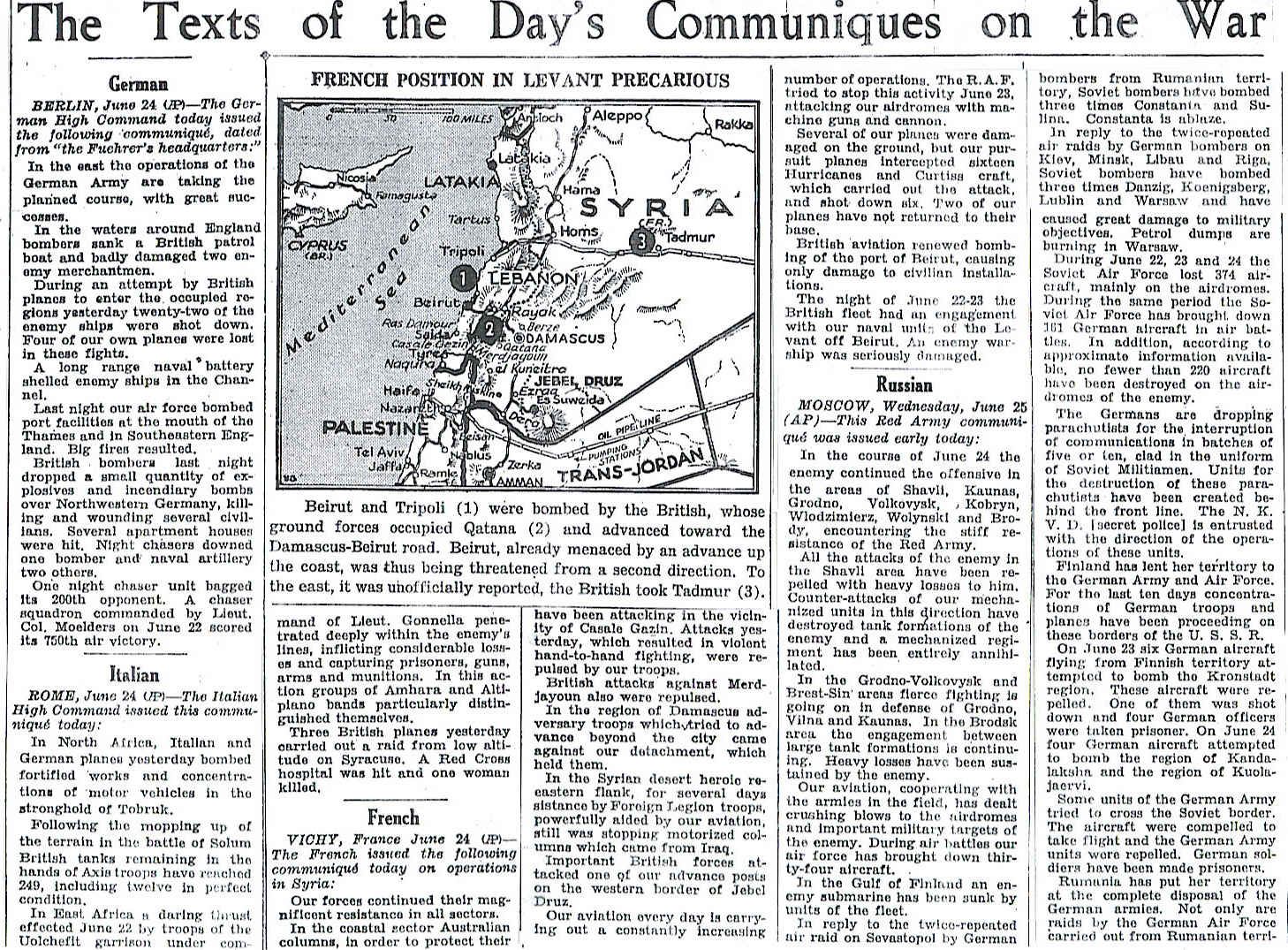
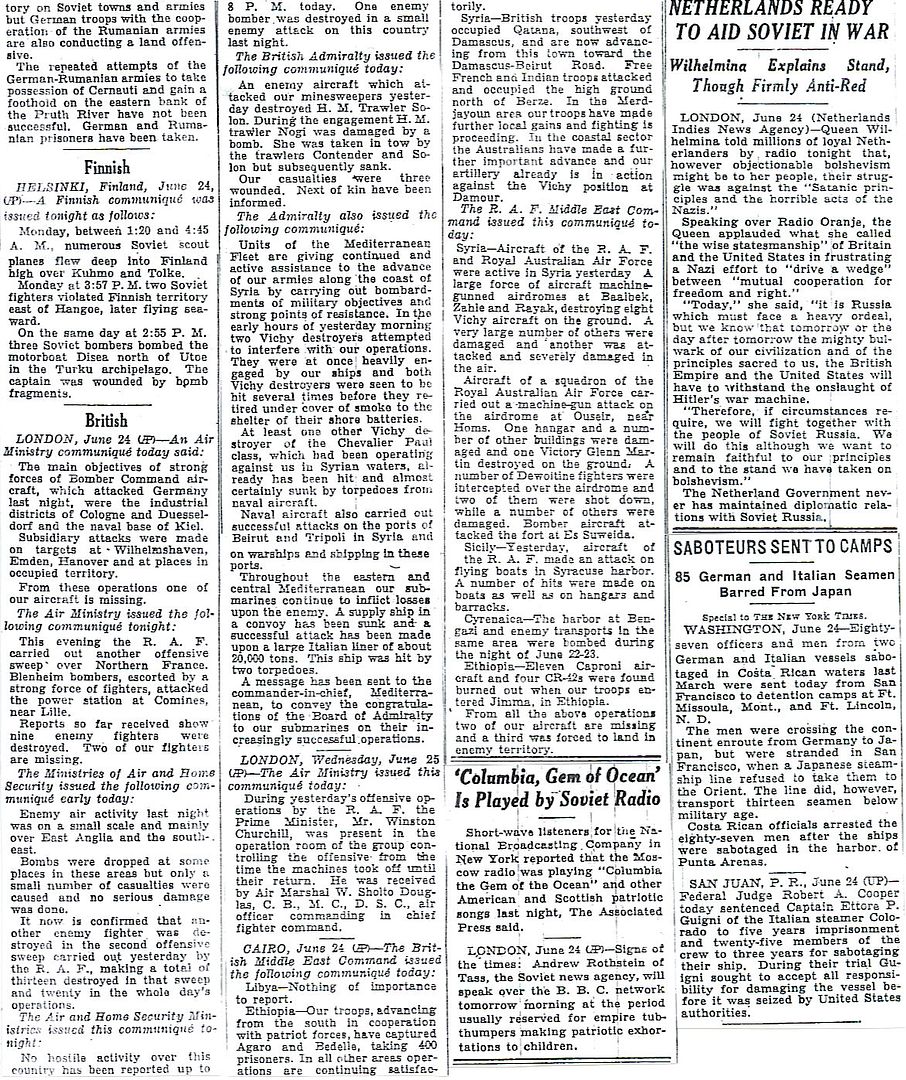
http://www.onwar.com/chrono/1941/jun41/f25jun41.htm
Germans threaten Bialystok salient
Wednesday, June 25, 1941 www.onwar.com
On the Eastern Front... The forces of Soviet West Front (Pavlov), principally deployed in the Bialystok salient and containing forces of the Soviet 3rd Army (Kuznetsov) southwest of Grodno and 10th Army (Golubev) west of Bialystok as well as 4th Army (Korobkov) to the south of the salient, are threatened by a double envelopment by the infantry of the German 9th and 4th Armies (of Army Group Center) marching from the north and south. In response, Pavlov orders all front and army reserves forward, west of Minsk. In the evening, German 47th Panzer Corps (part of Panzer Group 2) cuts the main route from Bialystok to the east, between Wolkowysk and Slonim, isolating the Soviet 3rd and 10th Armies in the Bialystok salient.
In Stockholm... The Swedish government announces that it will allow the Germans to move forces up to one-division strong through Sweden from Norway to Finland.
http://homepage.ntlworld.com/andrew.etherington/month/thismonth/25.htm
June 25th, 1941
UNITED KINGDOM: Westminster: Churchill reads his BATTLE OF THE ATLANTIC directive of March 6, to the House of Commons meeting in Secret Session.
He also reports on the improvements to the clearance of goods especially from the congested ports of the west coast. Goods are now shipped inland to ‘sorting depots’ from where they are more properly despatched. Railway lines to the ports have been enlarged and junctions improved and the number of mobile cranes increased.
SWEDEN: The Swedish government announces that Germans will be able to move forces through Sweden from Norway to Finland in a strength of up to one division.
FINLAND: Helsinki: Finland considers itself to be at war with the USSR after Soviet planes bomb the Finnish capital. Finland has already for some months now agreed to join the German attack, and the Soviet bombings come as heaven-sent excuse to start the hostilities. (Mikko Härmeinen)
Russian batteries shell the Finnish island of Morgonland, other nearby islands, and mainland targets, starting widespread forest fires. (Cris Wetton)
U.S.S.R.: The German attacks threaten to complete one of the first of the great circling movements. The Soviet 3rd and 4th Armies are being surrounded near Bialystok.
The first encirclement is closed by Hoth’s and Guderian’s forces near Baranovichi.
SYRIA:RN submarine HMS/M Parthian torpedoes Vichy French submarine Souffleur.
Commander of 25 Aust Bde at Jezzine is evacuated due to illness and fatigue. Replaced by Brig Plant who recommends ceasing all attacks on strong mountain-top positions, and hitting them with a combination of artillery concentrations and small infiltration patrols. Plant, a veteran of Gallipoli, considers this terrain worse. British air strength is increasing – Beirut will now be bombed every night until the Australian offensive on the Damour commences. (Michael Alexander)
CANADA: Corvette HMCS Spikenard arrived Halifax from Convoy OB 332
Minesweeper HMCS Medicine Hat launched Montreal, Province of Quebec.
Corvette HMCS Midland launched Midland, Ontario.
Corvette HMCS Lethbridge commissioned. (Dave Shirlaw)
U.S.A.: The motion picture “Caught in the Draft” is released in the U.S. This comedy, directed by David Butler, stars Bob Hope, Dorothy Lamour, and Eddie Bracken. Hope, a movie star who cannot stand loud noises, tries to avoid the draft by getting married but falls in love with a colonel’s daughter (Lamour). Then he and his two buddies accidentally enlist in the Army and his adventures in basic training are followed. (Jack McKillop)
In the second game of a three game baseball series at Yankee Stadium in New York City, St. Louis Browns pitcher Denny Galehouse gives up a home run to Yankee center fielder Joe DiMaggio extending DiMaggio’s hitting streak to 37-games. (Jack McKillop)
Same reaction... Turkey might very well become a regional cop. The USA sure as hell should not.
3 days into operation Barbarossa and the Soviets are reeling from the German onslaught. Hitler’s big mistake will come later when he sends his panzers from Army Group Center to help take Kiev in the South instead of pressing onto Moscow. This will cause about a 1 month delay in the spearhead moving toward the Russian capital. The delay will become a fatal mistake for the German advance since Stalin learns from his spies that the Japanese have no designs on taking any part of Siberia at the time. Stalin is free to move many Army divisions trained in winter fighting from the Far East to defend Moscow and he put General Zhukov in charge of Moscow’s defenses.
The Fortress Of Brest-Litovsk
On 22nd June, 45th Infantry Division did not suspect that it would suffer such heavy losses in this ancient frontier fortress.
Captain Praxa had prepared his assault against the heart of the citadel of Brest with great caution. The 3rd Battalion, 135th Infantry Regiment, was to take the Western Island and the central area with the barracks block. They had studied it all thoroughly at the sand-table. They had built a model from aerial photographs and old plans from the days of the Polish campaign, when, until it had to be surrendered to the Russians, Brest was in German hands. Guderian's staff officers realized from the outset that the citadel could be taken only by infantry, since it was proof against tanks.
The circular fortress, occupying an area of nearly two square miles, was surrounded by moats and river branches, and subdivided internally by canals and artificial watercourses into four small islands. Casemates, snipers' positions, armored cupolas with anti-tank and anti-aircraft guns, were established, well camouflaged, behind shrubs and under trees.
On 22nd June there were in all five Soviet regiments in Brest; these included two artillery regiments, one reconnaissance battalion, an independent anti-aircraft detachment, and supply and medical battalions.
General Karabichev, who was captured beyond the Berezina very early in the campaign, stated under interrogation that in May 1941 he had been instructed, as an expert in fortification engineering, to inspect the western defenses. On 8th June he had set out on his trip.
On 3rd June the Soviet Fourth Army had staged a practice alarm. The report on this exercise, which was captured by German units, had this to say about the 204th (Heavy) Howitzer Regiment: "The batteries were not ready to fire until six hours after the alarm." About the 33rd Rifle Regiment it said this: "The duty officers were unacquainted with the alarm regulations. Field kitchens are not functioning. The regiment marches without cover. . . ." About the 246th Anti-Aircraft Detachment it said: "When the alarm was given the duty officer was unable to make a decision." When one has read this report one is no longer surprised at the lack of organized resistance in the town of Brest.
But in the citadel proper the Germans got a surprise after all.
When the artillery bombardment began at 0315 hours the 3rd Battalion, 135th Infantry Regiment, was 30 yards from the river Bug, directly opposite the Western Island. The earth trembled. The sky was plunged in fire and smoke. Everything had been arranged in minute detail with the artillery units which were softening up the citadel: every four minutes the hail of death was to be advanced by 100 yards. It was an accurately planned inferno. No stone could be left standing after this lot. That, at least, was what the men thought as they lay pressed to the ground by the river. That was what they hoped. For if death did not reap its harvest inside the citadel, then it would surely get them.
After the first four minutes, which seemed like an eternity of thunder, at exactly 0319, the first wave leaped to their feet. They dragged their rubber dinghies down into the water. They jumped in. And like shadows, veiled by smoke and fumes, they paddled across. The second wave followed at 0323. The men reached the other bank just as if they were on an exercise. Swiftly they climbed the sloping ground. Then they crouched down in the tall grass. Hell above them and hell in front of them. At 0327 Second Lieutenant Wieltsch, commanding No. 1 Platoon, straightened up. The pistol in his right hand was secured by a lanyard so that, if necessary, he had both hands free for the hand-grenades he was carrying in his belt and in two linen bags slung over his shoulders. No word of command was needed. Bent double, they crossed a garden. They moved past fruit-trees and through old stables. They crossed the road which ran along the ramparts. And now they would enter the fortress through the shattered gate-house. But here they had their first surprise. The bombardment, even the heavy shells of the 60-cm. mortars, had done very little damage to the massive masonry of the citadel. All it had done was to waken the garrison and give the alarm. Half dressed, the Russians were scurrying to their posts.
Towards midday the battalions of 135th and 130th Infantry Regiments had forced their way deep into the fortress in one or two places. But at the eastern fort of the Northern Island, as well as by the officers' mess and the barracks block on the Central Island, they had not gained an inch. Soviet snipers and machine-guns in armored cupolas barred their way. Because of the close interlocking of attacker and defender the German artillery could not intervene. In the afternoon the corps' reserve, 133rd Infantry Regiment, was thrown into the fighting. In vain. A battery of assault guns was brought forward. With their 7-5-cm. guns they blasted the bunkers directly. In vain.
By evening 21 officers and 290 NCOs and men had been killed. They included Captain Praxa, the battalion commander, and Captain Krauss, commander of 1st Battalion, 99th Artillery Regiment, as well as their combat staffs. Clearly, it could not be done that way. The combat units were pulled back from the fortress, and artillery and bombers had another go. Carefully they avoided the ancient fortress church: there seventy men of the 3rd Battalion sat surrounded, unable to move forward or back. Luckily for them they had a transmitter and had been able to report their position to Division.
The third day of Brest dawned.
As the sun's rays penetrated the smoke they fell upon an old and wrecked Russian anti-aircraft position. Amid the rubble was Lance-Corporal Teuchler's machine-gun party, belonging to Second Lieutenant Wieltsch's platoon. A painful rattle came from the gunner's throat. He had been shot through the lung and was dying. The machine-gun commander was sitting up stiffly, his back against the tripod. He had been dead for hours. Lance-Corporal Teuchler was lying shot through the chest, slumped over his ammunition-box. The sun on his face brought him round again. Cautiously he rolled over on his side. He could hear agonized voices. He saw a muzzle flash from a casemate some 300 yards away every time a wounded man sat up or tried to crawl behind cover. Snipers! It was they who wiped out Teuchler's party.
At noon a strong assault detachment of 1st Battalion, 133rd Infantry Regiment, broke through from the Western Island to the citadel church. The trapped German troops were freed; Lance-Corporal Teuchler was found. But the relieving units got no nearer to the officers' mess. The eastern fort on the Northern Island was likewise still holding out. On 29th June Field-Marshal Kesselring sent in a Stuka Geschwader against it. But the 1000-pound bombs had no effect. In the afternoon 4000-pounders were dropped. Now the masonry was shattered. Women and children came out of the fort, followed by 400 troops. But the officers' mess was still being stubbornly defended. The building had to be demolished piece by piece. Not one man surrendered.
On 30th June the operations report of 45th Infantry Division recorded the conclusion of the operation and the capture of the fortress. The division took 7000 prisoners, including 100 officers. German losses totaled 482 killed, including 40 officers, and over 1000 wounded, of whom many died subsequently. The magnitude of these losses can be judged by the fact that the total German losses on the entire Eastern Front up to 30th June amounted to 8886 killed. The citadel of Brest therefore accounted for over 5 per cent, of all fatal casualties.
A story such as the defense of the citadel of Brest would have received tremendous publicity in any other country. But the bravery and heroism of the Soviet defenders of Brest remained unsung. Up to Stalin's death the Soviets simply took no notice of the heroic defense of the fortress. The fortress had fallen and many soldiers had surrendered—that, in the eyes of the Stalinists, was a disgrace. Hence there were no heroes of Brest. The chapter was simply expunged from military history.
The names of the commanders were erased.
But in 1956, three years after Stalin's death, an interesting attempt was made to rehabilitate the defenders of Brest. The publicist Sergey Smirnov published a little book entitled In Search of the Heroes of Brest-Litovsk. The reader discovers that the author had to go to a lot of trouble to track down the heroes who had survived the hell of Brest: they were all living inconspicuously, because fifteen years after the battle and ten years after the end of the war they were still being regarded as suspect and dishonored. Smirnov writes:
We have in Russia about 400 survivors of the battle of the citadel of Brest. Most of them were seriously wounded when the Germans took them prisoners. It must be admitted that we have not always treated these men as we should have done. It is no secret that the people's enemy Beria and his henchmen encouraged an incorrect attitude to former prisoners of war, regardless of the manner in which these men became prisoners or how they bore themselves while in captivity. That is the reason why we have not so far been told the truth about Brest-Litovsk.
And what was that truth?
Smirnov found it on the walls of the casemates. There, scratched with a nail into the plaster, he read: "We are three men from Moscow-Ivanov, Stepanchikov, and Shuntyayev. We are defending this church, and we have sworn not to surrender July 1941.." And below we read: " I am alone now. Stepanchikov and Shuntyayev have been killed. The Germans are inside the church. I have one hand-grenade left. They shall not get me alive."
In another place we read: " Things are difficult, but we are not losing courage. We die confidently. July 1941."
In the basement of the barracks on the Western Island there is an inscription: " I will die but I will not surrender. Farewell,my native country." There is no signature, but instead the date, 20.7.41. It appears therefore that individual groups in the dungeons of the citadel continued resisting until the end of July.
It was a long time before the heroes of the citadel of Brest were recorded in Soviet history. They have earned their place there. The manner in which they fought, their perseverance, their devotion to duty, their bravery in the face of hopeless odds —all these were typical of the fighting morale and powers of resistance of the Soviet soldier. The German divisions were to encounter many more such instances. The stubbornness and devotion of the defenders of Brest made a deep impression on the German troops. Military history has but few examples of similar disdain for death. When Colonel-General Guderian received the reports on the operations he said to Major von Below, the Army High Command's liaison officer with the Panzer Group, " These men deserve the highest admiration."
German troops dug in along one of the canals inside Brest-6/23/41
Hitler Moves East-Paul Carell
Other items from my notes include:
At the end of the day on Jun 25th, 291 ID and 61 ID have blown a 50 kilometer hole in the Soviet Defenses in Lithuania.
291st has surrounded Libua, where a mixed group of Soviet Units, including a large group of NKVD (the zealots) have retreated to. They will fight bitterly for the next couple of days, before surrendering.
Somewhere in this mess, in the middle of the hole along the road to Riga, are the trucks of my Grandfather’s Bridging Company, who have lost their infantry escort somewhere along the way, and have joined up with a Krad group.
Meanwhile, to the East, 1st and 6th Panzer, along with 36th Motorized, have blown completely between the Soviet 8th and 11th Armies, and will soon be counter-attacked by 300 Soviet tanks.
I found a great map with positions through 8 July, and will post it next.
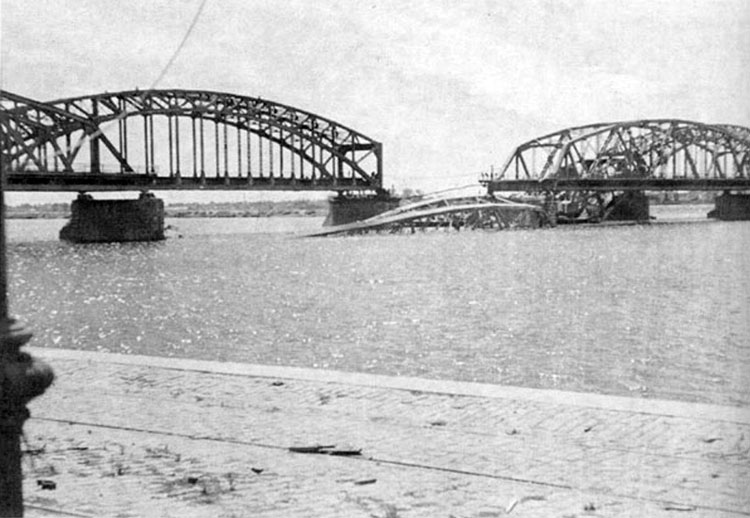 First bridge my grandfather and his team worked on, the Daugava River bridge at Riga.
First bridge my grandfather and his team worked on, the Daugava River bridge at Riga.
I think it is wonderful that we have contributors who are but one or two generations removed from relatives who participated in the war in the east. Most of my own ancestors emigrated from Germany, but long enough ago so that WWII didn't start for them until 12/7/41. That's the perspective I had when I began posting these threads and I think that is how most Americans think of the war (at least those who think of it at all). I won't speak for those other Americans, but personally, I am getting a whole new outlook.
This is fantastic. Thanks for posting this.
I think it's a point of debate amongst experts whether, by itself, taking Moscow in the fall of 1941 would have won the war for Hitler.
Suppose, for example, Hitler had decided to go straight for Moscow, ignoring Soviet Armies around Kiev -- what would happen?
Well, first of all, Stalin was already preparing to abandon Moscow, and move the Soviet government, along with much manufacturing, further East.
In the process, he would have burned Moscow to the ground.
Second, those Soviet armies near Kiev would have escaped the German pincer movements, and lived to fight another day.
So Hitler would have gained a burned ruin formerly called "Moscow", while the Soviets would have simply moved their government and saved much of the southern military force.
Not such a good outcome, from Hitler's perspective, I'd suppose.
To have really defeated Stalin, what Hitler needed to do was persuade his Japanese allies to go against their own perceived best interests (seizing southern raw materials), and attack the Soviets instead, to keep Stalin's eastern forces tied down, while Hitler defeated Soviet western forces.
But at the time -- fall of 1941 -- neither Hitler nor the Japanese could see why that might be necessary.
Disclaimer: Opinions posted on Free Republic are those of the individual posters and do not necessarily represent the opinion of Free Republic or its management. All materials posted herein are protected by copyright law and the exemption for fair use of copyrighted works.